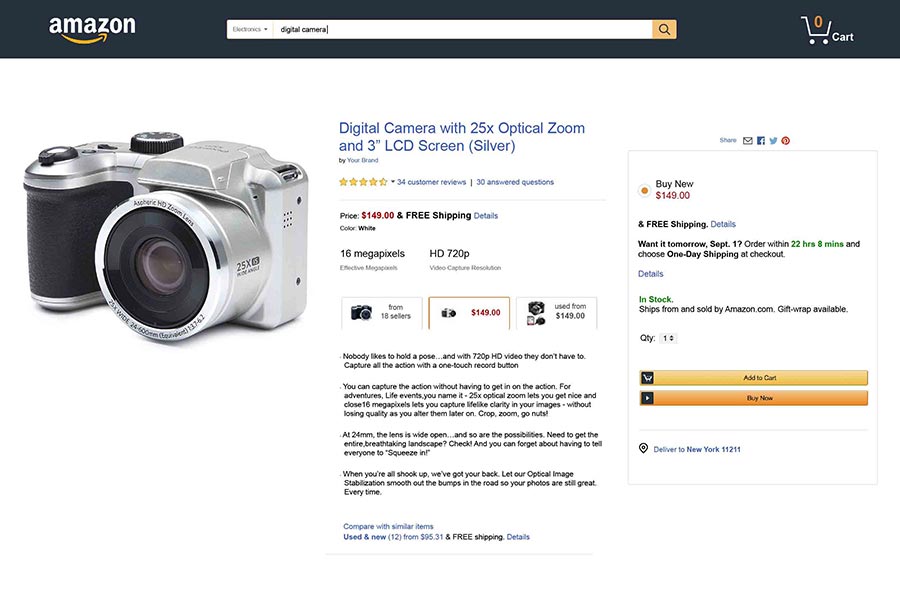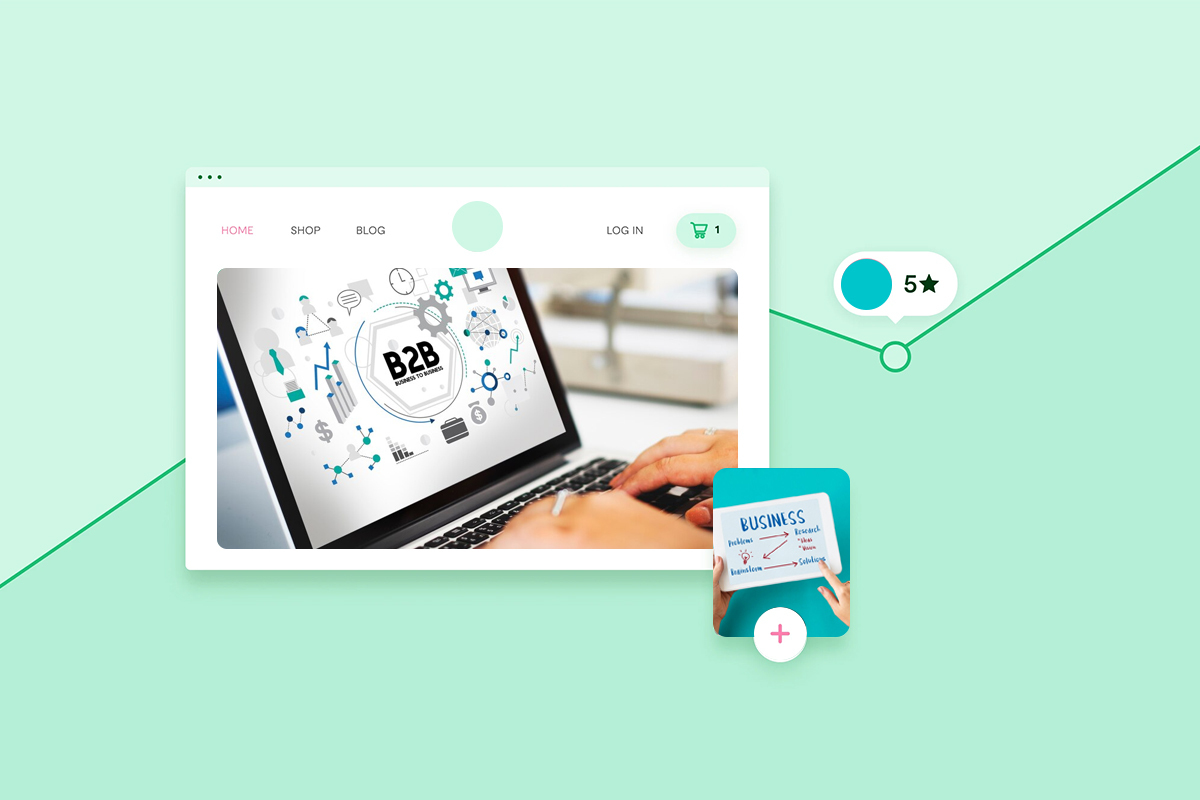2025 is not too far away, and it’s time for B2B businesses to start revamping their e-commerce strategies. With the rise of online shopping, B2B e-commerce has become a highly competitive landscape. To stay ahead of the curve, you need to understand the key differences between B2B and B2C e-commerce and identify game-changing strategies for success.
In this blog, we will take an in-depth look at the emerging trends in B2B e-commerce and explore how they can help your business achieve growth. We’ll discuss everything from enhancing product details on your website to leveraging social media marketing and optimizing on-site search capabilities. Additionally, we’ll cover how to overcome common challenges in B2B e-commerce such as building robust catalogs and navigating payment trends. Lastly, we’ll provide insights into anticipating emerging trends for 2025 and aligning business processes for scalability. By the end of this blog, you’ll be equipped with winning B2B e-commerce strategies that can drive growth for your business in 2025 and beyond.
Understanding the B2B E-commerce Landscape
Navigating the B2B e-commerce landscape involves understanding the unique purchasing behavior of businesses. This requires a deep dive into the complex buying process, involving multiple decision-makers and a longer sales cycle compared to B2C e-commerce. It’s essential to tailor the e-commerce store to cater to specific industry needs and provide the necessary tools for bulk ordering and negotiation. Optimizing the website for search engines and providing in-depth product details is the first step. Additionally, implementing software services to manage customer relationships and streamline ordering processes is a good idea to attract and retain new customers. Embracing phone calls and email newsletters can also foster better communication and trust with potential clients.
The Rise of B2B E-commerce
With the B2B e-commerce market experiencing rapid growth, businesses are increasingly turning to digital platforms for their purchasing decisions. Online sales are reshaping the B2B e-commerce market. Easier access to product information is transforming the purchasing process, making e-commerce platforms essential for business customers. This paves the way for new customer acquisition and enhances the overall store experience. Moreover, embracing these changes is crucial, and leveraging them effectively can be the first step toward achieving sustainable business growth.
Key Differences Between B2B and B2C E-commerce
B2B e-commerce emphasizes fostering robust customer connections, acknowledging the distinct needs of corporate buyers, and prioritizing potent sales processes. Tailored marketing strategies address the intricate nature of business purchasing experiences within the evolving digital commerce landscape.
In addition, here’s an article on Trust in E-commerce: Key to Success in Online Business.
Game-Changing B2B E-commerce Strategies for 2025
Enhancing your e-commerce store with immersive product details and compelling product names can be the first step to capturing the attention of new customers. Leveraging social media marketing and email newsletters is a good idea to attract potential clients and drive sales. Optimizing on-site search capabilities and mobile frontend goes a long way in providing a seamless user experience. Providing flexible pricing and ordering alternatives, including credit card and phone call orders, caters to varying customer preferences. In 2025, prioritizing high-quality customer service and investing in software services for streamlined operations are crucial for sustainable growth.
Enhancing Product Details on Your Website
Generating comprehensive product information is pivotal for B2B customers, influencing their purchasing decisions and enhancing the overall buying experience. The optimization of product pages significantly contributes to improved conversion rates, making it a crucial aspect of successful e-commerce strategies. To engage new customers and drive growth, include detailed product names and information in your e-commerce store. Leverage email newsletters and social media platforms to showcase rich product content, attracting potential clients and fostering brand loyalty. Moreover, by prioritizing high-quality product details, B2B businesses can ensure a competitive edge in the market.

Leveraging Social Media Marketing
Incorporating social media platforms into B2B e-commerce marketing is essential for expanding the customer base. These platforms serve as powerful tools to reach potential B2B customers and foster brand awareness through engaging content. B2B companies must integrate social media strategies into their marketing campaigns to attract new customers and promote their e-commerce stores. Using social media for B2B e-commerce is beneficial for showcasing products, creating visibility, and generating leads. It can also involve email newsletters, phone calls, and credit card payments, making it a crucial step in successful B2B e-commerce strategies.
Optimizing On-Site Search Capabilities
Efficiently enhancing the user experience on e-commerce websites, streamlining customer buying experiences through advanced search functionalities, and prioritizing search engine optimization is critical for B2B e-commerce platforms. This contributes to higher customer satisfaction and drives business buyers toward purchase decisions. Prioritizing on-site search optimization is a good idea as it attracts new customers, ensures seamless navigation of the e-commerce store, and provides a competitive edge. Additionally, implementing robust search capabilities is the first step in attracting and retaining customers, optimizing conversions, and ultimately driving business growth through a seamless and intuitive user experience.
Providing Flexible Pricing and Ordering Alternatives
In today’s competitive B2B e-commerce landscape, catering to the unique needs of business customers by offering diverse pricing and ordering alternatives is key. The flexibility in pricing options not only enhances the customer purchasing journey but also contributes to repeat B2B customers and supports business loyalty programs. B2B e-commerce platforms benefit significantly from tailoring pricing options to different customer segments, making it a good idea to prioritize this approach as the first step in driving customer retention and attracting new customers to your e-commerce store.

Encouraging Customer Reviews and Ratings
Encouraging customer feedback is crucial within the B2B e-commerce landscape. Customer reviews and ratings not only foster brand loyalty but also enhance the purchasing experience for business customers. Leveraging such feedback plays a vital role in optimizing conversion rates, attracting new customers, and influencing the purchase decisions of potential clients. Further, it’s a good idea for B2B e-commerce stores to prioritize customer reviews and ratings as the first step towards building credibility and trust among their clientele. Embracing customer feedback can significantly impact the growth and success of B2B e-commerce businesses.
Investing in Mobile Front-end Optimization
Investing in mobile front-end optimization is essential for the success of B2B e-commerce strategies. B2B e-commerce platforms can greatly benefit from prioritizing mobile user experience, as it enhances the business buying experience and is a critical aspect of digital commerce for B2B customers. Prioritizing mobile frontend optimization allows businesses to cater to the increasing number of mobile users, ensuring a seamless and efficient buying process for new customers. Enhancing the e-commerce store for mobile users should be seen as the first step in reaching out to a wider audience and staying ahead of the competition.

Prioritizing High-Quality Customer Service
Delivering exceptional support fosters brand loyalty and trust. Tailoring service experiences boosts satisfaction. Exceptional service often results in positive reviews and referrals. Efficient assistance drives repeat business and customer retention. Innovative service strategies set your business apart. Prioritizing high-quality customer service is crucial for differentiation and customer satisfaction.
Check out an article on Tips for Improving E-commerce Accessibility & Inclusivity.
Emerging Trends in B2B E-commerce
In the rapidly evolving landscape of B2B e-commerce, staying abreast of emerging trends is crucial to staying ahead. Inbound marketing, conversion rate optimization (CRO), email marketing, and social commerce are shaping the future of B2B transactions. Customer personalization, mobile optimization, PWAs, omni-channel sales, and augmented reality for immersive product experiences are also key factors driving the evolution. Embracing these trends can attract new customers, revitalize your e-commerce store, and position your brand as an industry leader in 2025.
Inbound Marketing
In today’s competitive B2B landscape, inbound marketing strategies play a pivotal role in attracting, engaging, and delighting potential buyers. Valuable content shared through blogs, social media, and webinars is instrumental in driving inbound marketing success. Leveraging search engine optimization (SEO) is a critical element in ensuring the effectiveness of inbound marketing efforts. The ultimate goal of inbound marketing strategies is to create a seamless customer journey and a compelling buying experience. Additionally, engaging storytelling and impactful case studies serve as powerful tools in the realm of inbound marketing, nurturing relationships, and driving new customers to your e-commerce store.

Conversion Rate Optimization (CRO)
To achieve optimal results in Conversion Rate Optimization (CRO), fundamental steps such as analyzing user behavior and conducting A/B testing are essential. Additionally, the creation of compelling landing pages and the optimization of product recommendations significantly impact driving conversion rates. Furthermore, ensuring a seamless order fulfillment and checkout process is critical for the success of CRO. Leveraging insights from the customer journey can also contribute to optimizing conversion rates, along with the effective use of social proof and customer reviews. Embracing these strategies is crucial in confidently enhancing CRO for your B2B e-commerce store.
Email Marketing
Nurturing leads and driving conversions, effective email marketing campaigns play a pivotal role in B2B e-commerce success. Enhanced effectiveness is achieved through segmenting email lists based on customer preferences. Personalized email content contributes to higher engagement and conversion rates, making it a reliable channel for reaching business buyers and decision-makers. Implementing best practices such as personalized product names and relevant email newsletters is the key to leveraging email marketing for the e-commerce store. Embracing email marketing as the first step in engaging with new customers is a good idea for an e-commerce business.

Social Commerce
Expanding reach and engaging potential customers through social platforms is a key strategy in B2B e-commerce. Seamlessly integrating buying experiences within social media platforms enhances brand awareness and customer engagement. Social commerce enables precise targeting of audience segments while sharing infographics and product information on social media supports these efforts. Leveraging social commerce is a confident pathway to effectively connect with new customers, making it a valuable addition to any B2B e-commerce store’s strategy. Enhancing customer engagement through social commerce can be a pivotal first step in driving business growth.
Customer Personalization
Enhancing customer buying experiences through personalized product recommendations and content is a proven strategy for driving higher conversion rates. Effective customer personalization relies on leveraging valuable customer data and insights to tailor pricing, product bundles, and marketing communications to individual customer needs. This tailored approach not only drives sales but also fosters brand loyalty and encourages repeat business. Implementing customer personalization strategies is the first step towards building strong and lasting relationships with new customers, ensuring the long-term success of your B2B e-commerce store.
Mobile Optimization and PWAs
In the competitive world of e-commerce, ensuring your mobile optimization is top-notch is the first step towards capturing new customers. Leveraging Progressive Web Apps (PWAs) can be a good idea to enhance user experience and engagement, creating a seamless journey for potential buyers. With evolving customer behaviors, implementing mobile-first strategies is a crucial move that aligns with the future of e-commerce. Moreover, it’s clear that prioritizing mobile optimization is not just about user experience – it’s about driving conversion rates, boosting sales, and propelling your e-commerce store forward.
Omnichannel Sales
Aligning marketing, sales, and customer service efforts is crucial for fostering brand loyalty by providing consistent customer experiences across multiple channels. Engaging customers at various touchpoints is essential for the success of omnichannel sales strategies. Understanding customer behavior through data analysis plays a fundamental role in achieving omni-channel sales. Furthermore, by contributing to a holistic view of the customer journey and purchasing decisions, omnichannel sales strategies provide valuable insights that can be leveraged to drive business growth.
Augmented Reality for Immersive Product Experiences
Augmented reality (AR) technology revolutionizes product visualization and customer experience, elevating the buying journey. Immersive AR experiences boost customer confidence and satisfaction, influencing their purchasing decisions positively. Implementing AR product demonstrations enriches the shopping experience, reducing product returns and enhancing overall customer satisfaction. Leveraging AR technology sets e-commerce businesses apart, driving sales and establishing a competitive edge in the market. Incorporating AR technology into your e-commerce store is a strategic move to set your business apart, attract new customers, and provide an unparalleled shopping experience. Embracing AR technology is a good idea for enhancing product engagement and differentiation.

An article about Marketplace Personalization with Machine Learning Made Easy might be of interest to you.
Overcoming Challenges in B2B E-commerce
Addressing common B2B e-commerce challenges involves building robust catalogs, navigating payment trends, and finding solutions for typical issues. Robust catalogs ensure that all products are displayed effectively, providing a smooth shopping experience for new customers. Navigating payment trends such as credit card processing and software services integration is vital for a seamless e-commerce store. Finding solutions for typical issues, like streamlining product names and making phone calls easily accessible, is equally important. Overcoming these challenges can be the first step toward success in B2B e-commerce. Embracing these strategies is a good idea and can pave the way for long-term success in the industry.
Addressing Common B2B E-commerce Challenges
Implementing tailored marketing strategies to meet the unique needs of business buyers is a priority. Leveraging digital marketing is a key step in expanding the customer base and engaging with new customers. Optimizing the e-commerce store for conversion rate optimization is crucial for driving sales and enhancing brand loyalty through personalized marketing campaigns. Live chat support can significantly assist customers in making informed purchasing decisions while utilizing email newsletters and blog posts prove to be essential for reaching out to potential clients.
Building Robust B2B E-commerce Catalogs
To enhance your B2B e-commerce catalogs, curate product information tailored to your target audience’s needs. Implement powerful marketing strategies to boost brand awareness and loyalty. Utilize customer reviews for authentic product recommendations and implement advanced tools for e-commerce platform search optimization. Embrace content marketing to engage customers and strengthen brand loyalty. Leveraging these strategies will attract new customers and enhance the shopping experience in your e-commerce store, leading to business growth and profitability.
Navigating B2B Payment Trends
Incorporating loyalty programs can significantly enhance the customer experience, fostering repeat purchases and loyalty from new customers. Implementing best practices for your e-commerce sales process ensures smooth transactions and customer satisfaction. Utilizing email marketing for repeat customers is a good idea to maintain engagement and encourage future purchases. Employing digital marketing strategies targeted toward business customers can effectively drive growth and increase sales on your e-commerce store. Additionally, by implementing e-commerce marketing strategies, you can effectively attract and retain business customers, ultimately leading to scalable growth and success.
Here’s an article on Fintech Trends 2023: Paving the Way for a Cashless Economy, check it out.
Future of B2B E-commerce
Anticipating the emergence of new customers and their needs is a good idea for the future of B2B e-commerce. With the rise of technology, e-commerce stores must adapt by integrating advanced software services to cater to changing consumer behaviors. Providing flexible payment options beyond credit card transactions and investing in mobile optimization will be imperative for staying ahead. Additionally, leveraging email newsletters and social media platforms will remain crucial for engaging with potential clients. Adapting to these changes will be the first step towards thriving in the evolving landscape of B2B e-commerce.
Anticipating Emerging B2B E-commerce Trends for 2025
In 2025, B2B e-commerce strategies will need to anticipate emerging trends to stay ahead. Leveraging digital channels will enhance customer service and target potential customers. Business model strategies for digital commerce will be critical. Real-life case studies from e-commerce companies can drive business growth. Utilizing infographics for digital marketing strategies will also be a key approach. Anticipating these trends is the first step towards adapting to the evolving landscape of B2B e-commerce.

Aligning Business Processes for Scalability
To drive business growth and scalability, leverage conversion rate optimization strategies tailored for business buyers. Implement loyalty programs and digital marketing strategies to expand the e-commerce market and target repeat customers. Employ A/B testing to optimize the sales process for e-commerce companies. Moreover, the strategic utilization of these approaches is instrumental in aligning business processes for scalability and ensuring long-term success in the B2B e-commerce landscape.
Can B2B E-commerce Strategies Drive Business Growth?
Implementing effective B2B e-commerce strategies can significantly drive business growth. By expanding your online store through e-commerce platform strategies, targeting potential customers with social media strategies, expanding your sales team through business model strategies, and fostering brand loyalty with e-commerce marketing strategies, you can achieve substantial growth. Additionally, utilizing digital marketing strategies can help attract repeat customers.
Conclusion
In conclusion, implementing effective B2B e-commerce strategies is crucial for driving business growth in the ever-evolving digital landscape. By understanding the unique dynamics of B2B e-commerce and staying ahead of emerging trends, you can gain a competitive advantage and capture new opportunities in the market. Enhance your product details, leverage social media marketing, optimize on-site search capabilities, and provide flexible pricing and ordering alternatives to meet the evolving needs of your customers. Encouraging customer reviews and ratings, investing in mobile frontend optimization, and prioritizing high-quality customer service will further enhance your B2B e-commerce success. Overcome challenges by addressing common issues, building robust catalogs, and navigating payment trends. Anticipate emerging trends, align business processes for scalability, and position yourself for success in the future. In addition, to explore how these strategies can drive your business growth, get in touch with us today.



